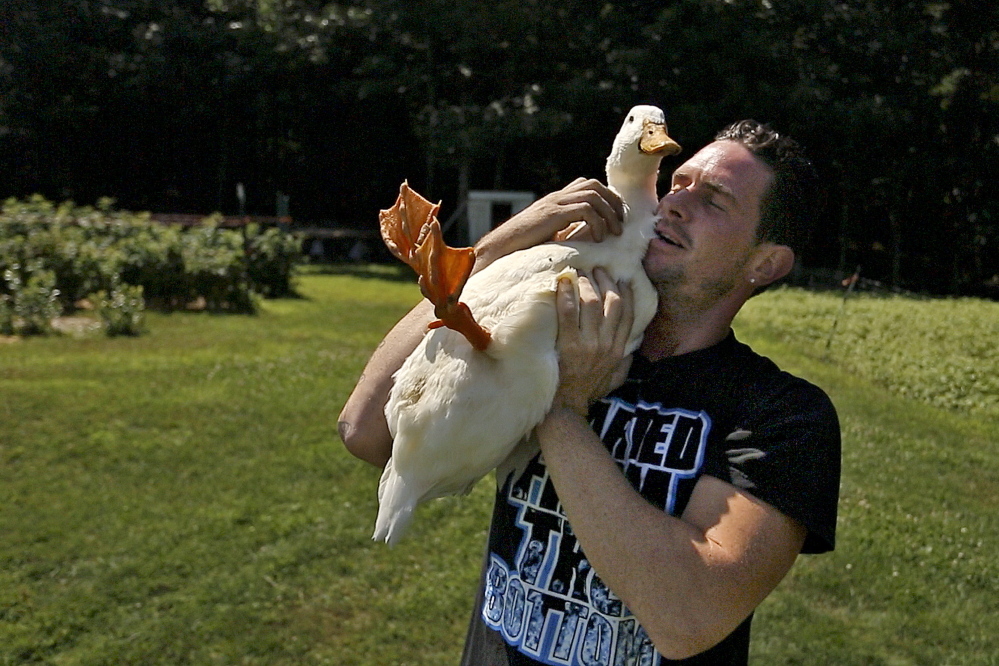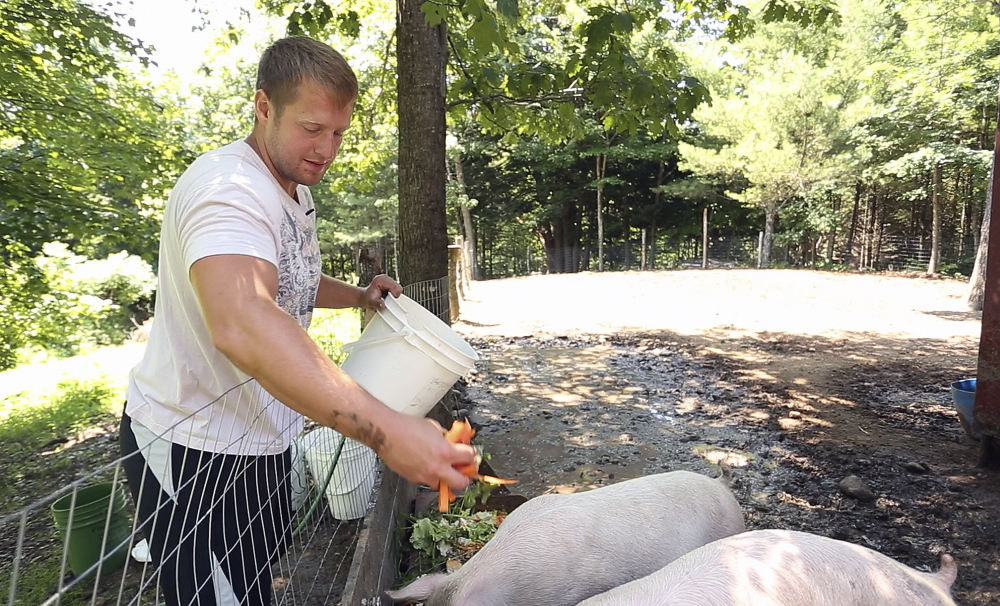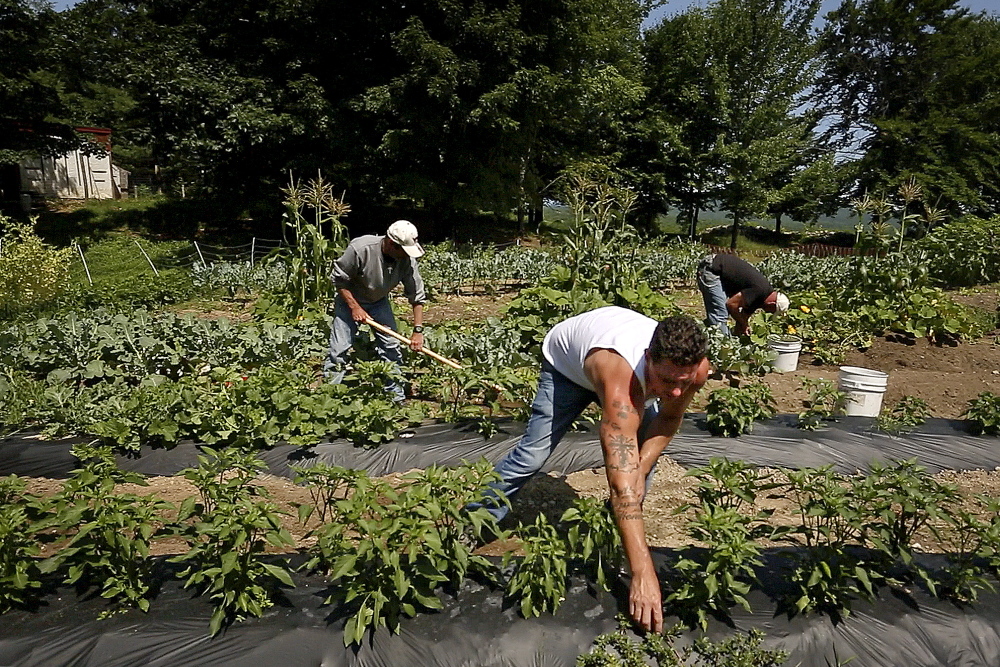Shane Scott has a captive audience as he stands under a shady oak tree at Angers Farm in West Newfield.
“That’s Shorty over there,” says Scott, 29, pointing to the smallest pig in a group of four.
The animals watch Scott’s every move as he hoists a bucket of apple peels and pours the contents over a wire fence. They dive in.
Scott has a contented smile on his face as he cools them off with a garden hose.
“I love physical work,” he says.
He points to a to a huge garden nearby. “A lot of those vegetable rows out there, I made.”
He’s a country boy. Being here feels good.
“I’ve just been stuck in cities the last six years,” says Scott.
Stuck in cities, shooting up heroin.
Scott, who grew up in a small town in New Hampshire, says he hit rock bottom after his sixth overdose. He arrived at the York County homeless shelter in Alfred four months ago.
Within a few days he was living at Angers Farm.
“It felt like the most safest place I’ve been for a long, long time,” he says.
It feels, he says, like home.
“I didn’t know how much I needed this place until I came here.”
Scott is determined to focus on the present – he knows it’s the key to his recovery.
He couldn’t have found a better place to do that, says therapeutic farm manager Marybeth Ontkush.
“Connecting with nature keeps you in the moment,” Ontkush says. “And connecting with the moment helps us to remember to take life one day at a time.”
Angers Farm is owned and operated by York County Shelter Programs. The white clapboard farmhouse sits on a hill with a breathtaking view of Mount Washington. It’s surrounded by fields and lush, well-tended gardens.
Bob Dawber, executive director of the programs, says the first time he visited the 105-acre property, it reminded him of a line from a favorite song – about having the opportunity to just rest and know that all will be OK.
“I think (the residents in treatment) get the sense that they can just let go of their worries for a while,” Dawber says.
The men who enter the program – there are 10 residential beds – undergo intense treatment for addiction. A big part of their therapy is working on the farm.
“When they’re caring for a new seedling or a new piglet,” says the program’s development director, Megan Gendron, “when they’re nurturing the crops and the animals, they’re learning to nurture themselves.”
The program isn’t a good fit for everybody. But for those who feel at home in this remote, rural setting, it seems to work magic.
Don Gean, the former longtime executive director of York County Shelter Programs – whose vision it was to buy Angers Farm and offer residential treatment there – says that when people live in a peaceful, productive place, they themselves become peaceful and productive.
“All people have great worth,” Gean says in an email, “and it’s the Farm’s job to let folks in on that truth.”
Brian Staplins, 55, arrived from Portland two years ago. Staplins had been on the streets, drinking and drugging, he says, for 40 years.
“I didn’t care about life,” says Staplins. “Didn’t care about people. Didn’t care about anything. I didn’t want to live anymore. Now I wake up every morning, by the grace of God, to live this new life that I have.”
He’s a permanent resident, who helps mentor new arrivals. It’s his calling, he says, his life lesson from Angers Farm. “It’s like God reaching into my heart and saying, ‘You mean something. Your life means something.'”
As Staplins sits on a small sofa near the farmhouse kitchen, reading, Carl Littlefield, 30, walks across the lawn with a duck named Mr. Quackypants following in his footsteps. His 8-year-old daughter named the duck. She’s the reason Littlefield is here.
“She’s all I got,” he says. “I need to straighten up for her.”
Littlefield has been clean for six months. He never thought that was possible.
“I can’t even begin to explain,” he says, “how much gratitude I have for the farm here. Ten guys in treatment, and I have basically 10 sponsors I can talk to whenever I want.”
Ten people working the land – and working toward recovery, together.
“Before if I was doing something for someone else, I wanted something in return,” Littlefield says. “But today it’s one of my biggest gifts that I got, being able to do things for other people.”
There’s no time limit on how long someone can stay at Angers Farm. Littlefield has been here since January and feels that he’s ready to move on – to face the world clean and sober.
“I’ll never forget this place, ever, in my life,” he says. “I never thought it possible to get clean and be happy.”
Send questions/comments to the editors.




